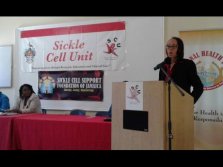
As the world celebrates World Sickle Cell Day today, June 19, the Sickle Cell Support Foundation of Jamaica (SCSFJ) and other stakeholders are urging the country to become more aware about the disease and of their status.
The public is being invited to a screening of a documentary on the disease titled Sickle-Cell Disease: Stories of Strength, Survival and Spirit at the Faculty of Law, The University of the West Indies, Mona, this evening at 6.
“What we decided was that what we really needed was a more meaningful way to explain to the Jamaican public why sickle-cell disease should be taken seriously, and we thought about developing a documentary.
“One of our members, Mr Noel Bell, is a videographer, and he has been working with his team producing a documentary. ... We’re hoping to have that documentary shown on social media and on various platforms so people will have a better idea of what it really means to have a child with sickle cell,” said co-founder and president of SCSFJ, Camille Daley.
The film is free to the public.
Sickle-cell disease (SCD) is an inherited blood disorder in which there are not enough healthy red blood cells to carry adequate amounts of oxygen throughout the body. It is passed on to the child when both parents have the sickle-cell trait or gene.
The sickle-cell trait usually does not cause any symptoms. If both partners have the sickle-cell trait, there is a 25 per cent chance at each pregnancy that the child will have SCD.
To find out if one carries abnormal genes and is at risk of having a child with SCD, persons can get tested by doing what is called a sickle-cell electrophoresis blood test, which costs $4,000 at the Sickle Cell Unit or any private lab across the island.
In Jamaica, one in every 150 babies born has a form of SCD, and every year, approximately 300 babies are born in Jamaica with the condition. One in every 10 persons is a carrier of the sickle-cell trait, and another five per cent of the population carry the other abnormal trait. Thus, 15 per cent are at risk of having a child with a form of SCD.
Symptoms of the disease include painful crises, jaundice, leg ulceration, hip and other bone damage, kidney disease, enlargement or atrophy of the spleen, and sickle retinopathy. Strokes occur in seven per cent of children with SS disease, the most severe form of SCD.
